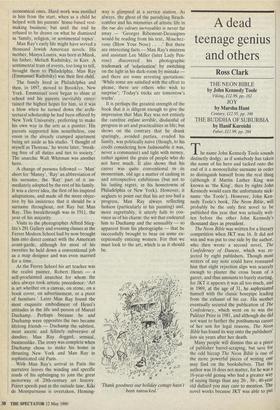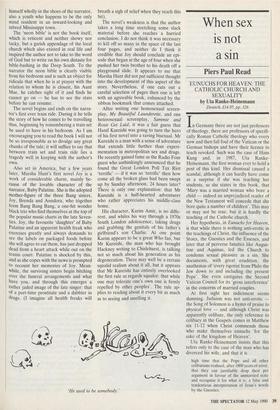A dead teenage genius and others
Ross Clark
THE NEON BIBLE by John Kennedy Toole Viking, 112.99, pp. 162 JOY THE BUDDHA OF SUBURBIA by Hanif Kureishi Faber, f12.99, pp. 284 The name John Kennedy Toole sounds distinctly dodgy, as if somebody has taken the name of his hero and tacked onto the end of it a monosyllabic surname in order to distinguish himself from the real thing (although if Martin Luther King was known as 'the King', then by rights John Kennedy would earn the unfortunate nick- name 'the Toole'). However, John Ken- nedy Toole's book, The Neon Bible, will probably be the only first novel to be published this year that was actually writ- ten before the other John Kennedy's thousand days as president.
The Neon Bible was written for a literary competition when JKT was 16. It did not win and was put to one side by the author, who then wrote a second novel, The Confederacy of Dunces, which was re- jected by eight publishers. Though most writers of any note could have reassured him that eight rejection slips was scarcely enough to plaster the cross beam of a garret, and thus amounts to barely starting, for JKT it appears it was all too much, and in 1969, at the age of 31, he asphyxiated himself with the classic hosepipe leading from the exhaust of his car. His mother eventually secured the publication of The Confederacy, which went on to win the Pulitzer Prize in 1981, and although she did not want to further the posthumous career of her son for legal reasons, The Neon Bible has found its way onto the publishers' lists six years after her death.
Many people will dismiss this as a piece of publisher barrel-scraping, but save for the odd hiccup The Neon Bible is one of the more powerful pieces of writing one' may find on the bookshelves. That the author was 16 does not matter, for he was a 16-year-old genius who had a greater way of saying things than any 20-, 30-, 40-year old dullard you may care to mention. The novel works because JKT was able to put himself wholly in the shoes of the narrator, also a youth who happens to be the only mind resident in an inward-looking and inbred Mississippi town. .
The 'neon bible' is not the book itself, which is reticent and neither showy nor tacky, but a garish appendage of the local church which also existed in real life and inspired the author not to take to the word of God but to write on his own distaste for bible-bashing in the Deep South. To the narrator the neon bible is clearly visible from his bedroom and is such an object for ridicule that when he is at prayer with the relation to whom he is closest, his Aunt Mae, he catches sight of it and finds he cannot go on — he has to see the stars before he can resume.
The novel begins and ends on the narra- tor's first ever train ride. During it he tells the story of how he comes to be travelling thus, beginning by remembering a train set he used to have in his bedroom. As I am encouraging you to read the book I will not be so irresponsible as to divulge any great chunks of the tale; it will suffice to say that between train set and train ride lies a tragedy well in keeping with the author's own.
Also set in America, but a few years later, Marsha Hunt's first novel Joy is a work of considerable charm, mainly be- cause of the lovable character of the narrator, Baby Palatine. She is the adopted mother-figure of the three Bang sisters, Joy, Brenda and Anndora, who tagether form Bang Bang Bang, a one-hit wonder black trio who find themselves at the top of the popular music charts in the late Seven- ties. Joy, the favourite 'daughter' of Baby Palatine and an apparent health freak who exercises greatly and always demands to see the labels on packaged foods before she will agree to eat them, has just dropped dead from a heart attack while out on the tennis court. Palatine is shocked by this, and as she copes with the news is prompted to recount her memories of Joy. Mean- while, the surviving sisters begin bitching over the funeral arrangements and what have you, and through this emerges a rather jaded image of the late singer: that of a part-time prostitute and a dabbler in drugs. (I imagine all health freaks will breath a sigh of relief when they reach this bit).
The novel's weakness is that the author takes a long time stretching some slack material before she reaches a hurried conclusion. I do not think it was necessary to kill off so many in the space of the last four pages, and neither do I think it credible that Joy should conclude an epi- sode that began at the age of four when she pushed her twin brother to his death off a playground slide. It appears to me that Marsha Hunt did not put sufficient thought into the development of this aspect of the story. Nevertheless, if one cuts out a careful selection of pages then one is left with an agreeable book, enhanced by the ribbon bookmark that comes attached.
After writing one homosexual screen- play, My Beautiful Launderette, and one heterosexual screenplay, Sammie and Rosie Get Laid, it was a fair guess that Hanif Kureishi was going to turn the hero of his first novel into a raving bisexual. Mr Kureishi is a man with a sense of adventure that extends little further than experi- mentation in metropolitan sex and drugs. He recently gained fame as the Radio Four guest who unthinkingly announced that he found the Great London Poll Tax Riot `terrific' — if it was so 'terrific' then how come all the broken glass had been swept up by Sunday afternoon, 24 hours later? There is only one explanation: that Mr Kureishi is a half-hearted adventurer who rather appreciates his middle-class home.
His character, Karim Amir, is no diffe- rent, and whiles his way through a 1970s South London adolescence, taking drugs and grabbing the genitals of his father's girlfriend's son Charlie. At one point Karim appears to be a great Who fan, but Mr Kureishi, the man who has brought Hackney writing to Chislehurst, is talking not so much about his generation as his degeneration. There may well be a certain squalid realism about it all, but it appears that Mr Kureishi has entirely overlooked the first rule as regards squalor: that while one may tolerate one's own one is firmly repelled by other peoples'. The rule ap- plies to reading about it every bit as much as to seeing and smelling it.
'He used to be somebody.'





























































 Previous page
Previous page